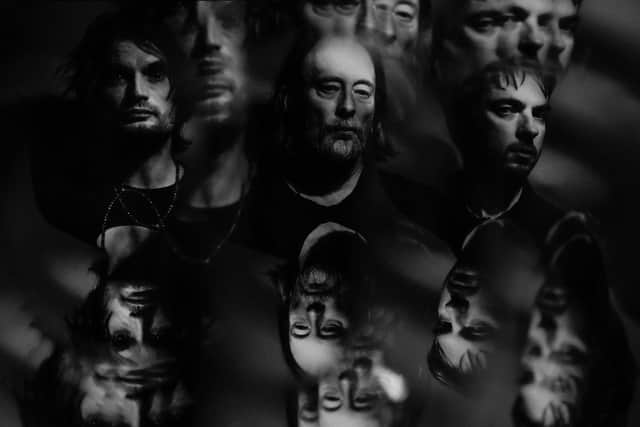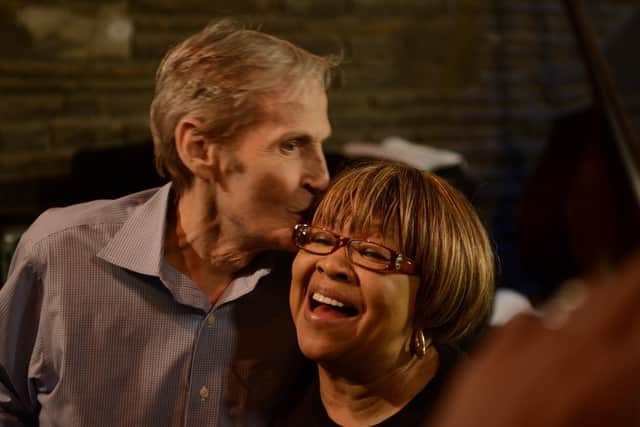Album reviews: Liam Gallagher | The Smile | Mavis Staples & Levon Helm


Liam Gallagher: C’mon You Know (Warner Records) ***
The Smile: A Light For Attracting Attention (XL Recordings) ****
Mavis Staples & Levon Helm: Carry Me Home (Anti-) ****
Since ditching his workmanlike post-Oasis outfit Beady Eye, Liam Gallagher has made a successful fist of reviving the Gallagher Jr brand without having to deviate musically from his classic rock-referencing comfort zone.
Advertisement
Hide AdAdvertisement
Hide AdSporting a title which is down there with Emeli Sandé’s Let’s Say For Instance for inspiration, his second solo album C’mon You Know may bear his name but is as much of a team effort as any Beady Eye offering. On this occasion, he has collaborated with the cream of indie and alternative rock, not least Foo Fighters frontman Dave Grohl, Vampire Weekend’s Ezra Koenig and Simon Aldred of Cherry Ghost, as well as his multi-tasking producers Greg Kurstin and Andrew Wyatt.
The album opens with a children’s choir yearning “I wish I had more power” but that’s about it for curveballs. Soon enough Gallagher weighs in with his best John Lennon impression, expressing something like regret while still spitting out the refrain. The big, wiggy psychedelic finish is a taste of more to come, from the blizzard of fuzz guitars on Don’t Go Halfway to the acid pop of Better Days.
The title track is Gallagher in full testifying “here we carpe diem” mode, and he is in his element singing against the widescreen rock canvas of Grohl/Kurstin co-write Everything’s Electric, but he pulls off the subtler, harmonic delivery of It Was Not Meant To Be and throws in a bonus sweet, swirling fairground organ coda.


Elsewhere on his trip around rock’s back pages, he offers the Who-style jugband shuffle of World’s In Need, 60s pastoral pop ballad Moscow Rules and the pugnacious, punky momentum of I’m Free with a dub breakdown before rounding off with Macca pastiche Oh Sweet Children.
The Smile also give the public what they want in slightly more esoteric style. This trio of Thom Yorke and Johnny Greenwood plus drummer Tom Skinner from jazz warriors Sons of Kemet make like Radiohead in all but name, with producer Nigel Godrich on mixing duties and seamless contributions from London Contemporary Orchestra and Skinner’s jazz mates Byron Wallen, Theon Cross and Chelsea Carmichael among others.
A Light For Attracting Attention moves fluently from the garage tub-thumping of You Will Never Work In Television Again straight into the glacial piano ballad Pana-vision (used in the finale of Peaky Blinders) and on to the fidgety bassline and loose, shuffling beat of The Smoke in much the same fashion as Radiohead’s post-millennial albums.
Yorke leads in plaintive vocal form over dreamy synths and acoustic guitar on the Floydian ballad Free in the Knowledge and provides his own call-and-response on A Hairdryer, which is lightly propelled by Skinner’s skittering cymbals and Greenwood’s burnished psych guitar, while the mesmeric odyssey Skrting on the Surface features tender vocals, meandering brass and elastic guitar lines.


Advertisement
Hide AdAdvertisement
Hide AdIn the summer of 2011, Mavis Staples teamed up with her fellow roots and gospel veteran Levon Helm to record live in his Woodstock studio. Carry Me Home bottles Mavis’s marvellous medicine, with appreciative whoops from all involved.
Staples must wonder if there has been any progress in her years at the civil rights coal face, telling it like it is on an updated take on Curtis Mayfield’s This Is My Country, capturing the happy/sad dynamic of Nina Simone’s I Wish I Knew How It Would Feel To Be Free and still searching on the a capella gospel standard Farther Along.
Her feet don’t fail her on the peppy You Got to Move, but she bears the burden gladly on Helm’s Wide River to Cross. Most poignant of all is her prophetic reprise of The Staple Singers’ This May Be the Last Time – Helm died the following spring.
CLASSICAL
Battle Cry: She Speaks (Delphian) ****
How often do you hear new music involving the theorbo? A relic of the Baroque, this versatile lute features in the captivating highlight of a new album, Battle Cry: She Speaks, by mezzo-soprano Helen Charlston and theorbo player Toby Carr. That towering title track is by the young Bristol-born composer Owain Park, a sequence of four songs aligned to the theme of abandoned women, which also informs the surrounding songs by Purcell (a gorgeous Dido’s Lament), Monteverdi, the rather Goon-ish sounding John Eccles, and the imaginative 17th century female composer Barbara Strozzi. Park’s work, to evocative texts by Georgia Way, is a hugely powerful centrepiece, sometimes Britten-like in its gaunt transparency, its folk allusions, and monumentally dramatic in the lengthy final song, Marietta. Carr throws in solo theorbo numbers by de Visée and Kapsberger. Charlston’s emotive mezzo is heroic throughout, lustrous and arresting. Ken Walton
JAZZ
Nimbus Sextet: Forward Thinker (Acid Jazz) ****
This polished, irresistibly groove-driven album from Glasgow’s Nimbus Sextet sees pianist Joe Nichols leading Michael Butcher on saxophones, Euan Allardice on trumpet, guitarist James Mackay, drummer Alex Palmer and bassist Mischa Stevens. Guests include singer Charlotte de Graaf, saxophonist Harry Weir and percussionist Steve Forman. High Time, with de Graaf’s lithe vocals, invokes slick, vintage jazz-funk, while the titular funk excursion works up an exhilarating groove, crisp brass chorusing over fast-forward bass and percussion from Stevens, Palmer and Forman, with saxophonists Butcher (tenor) and Martin Fell (alto) cutting loose along with Nichols’s glittering keyboard. Nichols’s solo Woodview, provides an unexpected, brief but lyrical interlude. A pandemic-inspired trilogy closes the album: the haunting brass calling of Search for Solace, the shimmering, trippy synths of Through the Shadows, and the joyous riffing and keyboard capers of To the Light. Jim Gilchrist